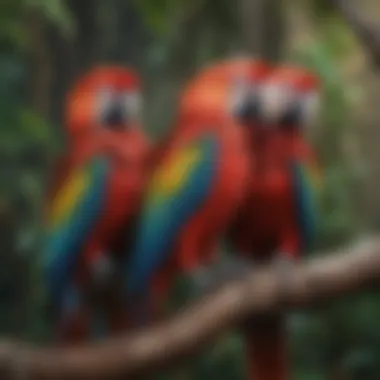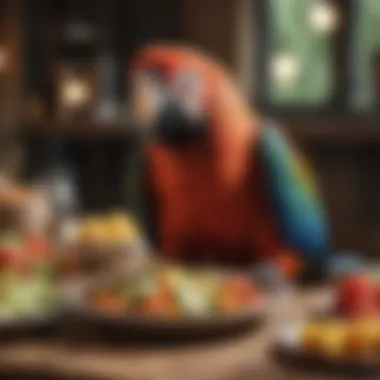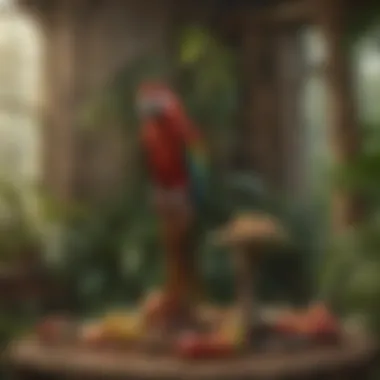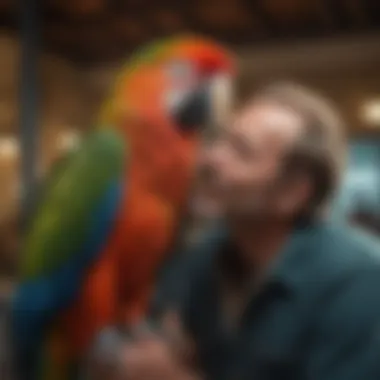Understanding Macaw Lifespan: Key Factors and Care Insights


Intro
Understanding the lifespan of macaws is essential, whether you are a current owner or toying with the idea of becoming one. These vibrant birds can live for decades, making them a significant commitment. When thinking about their longevity, it’s crucial to explore various factors that contribute to a macaw’s life span. This all-encompassing examination will cover their behavior, care practices, health needs, and more, enabling potential and existing macaw owners to make well-informed decisions.
Understanding Your Pet
Pet Behavior Basics
Macaws exhibit unique behaviors that reflect their intelligence. They are social creatures, needing not only companionship but also mental stimulation. Observing their body language is vital. For example, a macaw may raise its feathers or squawk when excited or threatened. Recognizing these signs helps create a better environment to cater to their needs.
Common Breed Characteristics
Different macaw breeds, such as the Blue-and-yellow Macaw or Green-winged Macaw, have distinct characteristics. Their colors, size, and personalities can vary significantly. Knowing these traits helps prospective owners choose a suitable breed based on their lifestyle and preferences. Researching each breed deserves attention to detail.
Species-Specific Needs
Each macaw has unique requirements regarding play, social interaction, and habitat. Larger species, like the Hyacinth Macaw, may need more space compared to smaller ones, such as the Scarlet Macaw. Consideration for their specific needs ensures a happier, healthier bird.
Pet Care and Maintenance
Feeding Guidelines
Proper nutrition is crucial for macaws. A balanced diet typically includes high-quality pellets, fresh fruits, and vegetables. Avoid feeding them too many seeds, as this can lead to health issues. Always ensure clean, fresh water is available. Tailoring a diet to meet the species' specific requirements supports a longer life.
Grooming Essentials
Macaws require regular grooming to maintain their feather condition and overall health. Bathing them can be done weekly, either through misting or providing a dish of water. Beak and nail care are important too. Allow your macaw to chew on safe wood or provide appropriate toys.
Hygiene Practices
Maintaining a clean living space is essential. Daily cleaning of the cage, removing uneaten food, and replacing bedding establishes a hygienic environment. Regular checks for mold or fecal buildup help prevent diseases, enhancing the bird's quality of life.
Training and Development
Basic Commands and Skills
Teaching basic commands fosters a stronger bond between macaws and their owners. Encouraging them to respond to commands like “step up” or “come here” makes handling easier and more enjoyable.
Behavioral Training Techniques
Positive reinforcement is an effective method for training macaws. Rewarding them with treats when they follow commands helps establish desired behaviors. Consistency is key, so training sessions should be frequent, even if brief.
Addressing Common Behavior Issues
Behavior issues may arise, such as biting or excessive screaming. Understanding the roots of these behaviors aids in addressing them effectively. Providing plenty of social interaction can reduce anxiety-based behavior problems.
Health and Wellness
Routine Vet Check-ups
Regular vet visits are a cornerstone of macaw care. These appointments help ensure that your macaw is healthy and up-to-date on vaccinations. A thorough examination can catch potential health issues early, which is vital for longevity.
Vaccination Needs
Vaccination is essential to protect macaws from various diseases. Discuss the necessary vaccinations with your avian veterinarian and make sure to keep a record of them.
Recognizing Signs of Illness
Observing your macaw for signs of illness is critical. Symptoms, such as changes in appetite, lethargy, or feather loss, should not be ignored. Monitoring their behavior allows for timely intervention, improving the chances of a swift recovery.
Enrichment and Activities
Indoor vs.


Outdoor Activities
Macaws need both indoor and outdoor activities. Safe outdoor time, under supervision, provides enrichment they greatly enjoy. Indoor activities that include climbing structures and toys support their natural behaviors.
Interactive Toys and Games
Providing stimulating interactive toys keeps macaws mentally engaged. Wooden toys, for instance, allow them to chew and explore while ensuring their cognitive requirements are met.
Socialization Opportunities
Socializing with other birds or people is important. Engaging in activities with your macaw not only strengthens your bond but also fosters a happier, healthier bird.
Remember, the right care and attention can significantly impact a macaw's lifespan. By being well-informed, you ensure not only a rewarding experience for yourself but also a fulfilling life for your macaw.
Preamble to Macaws
Understanding macaws is crucial for anyone interested in these lively and intelligent birds. Macaws, known for their stunning colors and complex behaviors, require special attention and care. This section introduces macaws and explores reasons why they captivate so many owners and enthusiasts.
Defining Macaws
Macaws are large, long-tailed parrots native to the forests of Central and South America. They belong to the family Psittacidae, which includes various parrot species. Macaws have distinctive features, such as strong, curved beaks, long wings, and striking plumage. Their size varies from medium to large, with some species reaching over 3 feet in length. There are many traits unique to this avian group, and they are known for their vocalizations, social behaviors, and intelligence. With proper care, macaws can live long and fulfilling lives, forging deep bonds with their caretakers.
Popular Species of Macaws
Several macaw species stand out amongst bird enthusiasts. Well-known types include:
- Blue and Gold Macaw: This species is popular for its vibrant blue and yellow feathers, known for their friendly disposition.
- Scarlet Macaw: Recognizable by its bright red, yellow, and blue feathers, the Scarlet Macaw captivates with its beauty.
- Green-Winged Macaw: Often noted for its striking green wings and large size, this species is also highly social.
- Hyacinth Macaw: The largest of all macaws, this stunning bird is known for its deep blue coloration and gentle temperament.
Each species presents its own set of care requirements and characteristics. Understanding these differences is beneficial for prospective owners. Macaws can be fantastic companions, but their specific needs must be met.
In summary, knowing about macaws is essential for anyone considering keeping these remarkable creatures. Their beauty and temperament are alluring, but they also require attention to thrive as pets.
Macaw Lifespan Overview
Understanding the lifespan of macaws is essential for potential owners and enthusiasts. The lifespan of these vibrant creatures is not just a number; it reflects their overall health, the environment they live in, and the care they receive. Knowledge about macaw longevity helps guide choices about nutrition, housing, and regular check-ups, ultimately ensuring a fulfilling relationship with these birds.
Average Lifespan of Macaws
On average, macaws can live anywhere from 30 to 50 years when well cared for. Some species, like the Blue-and-yellow Macaw, may live closer to 30 years, while others, such as the Scarlets, can reach up to 40 years or more. Lifespan can vary widely depending on genetics, quality of care, and environmental factors. Here are a few key points about their average lifespan:
- Nutrition: A balanced diet plays a crucial role in their overall well-being.
- Living Environment: A spacious and stimulating habitat contributes to better mental and physical health.
- Social Interaction: Regular interaction with humans and other birds can improve their emotional health.
It is significant to approach macaw ownership with a long-term perspective, as these birds can become lifelong companions.
Variations Among Species
Different species of macaws reflect distinct lifespans due to their unique genetics and specific care needs. While the average lifespan provides a general guideline, individual species exhibit variations that potential owners should acknowledge.
Some notable species and their typical lifespans include:
- Hyacinth Macaw: Known for its striking blue color, this species can live up to 50 years or more.
- Green-winged Macaw: Generally lives around 40 to 50 years, making it a long-term commitment for owners.
- Illiger's Macaw: A smaller species that averages around 30 years but can surpass that with proper care.
These species differences illustrate that understanding each macaw type is important for assessing care requirements and potential lifespan. Awareness of species-specific traits can guide pet owners in making informed decisions about their future with these remarkable birds.
Factors Influencing Macaw Lifespan
Understanding the factors that influence the lifespan of macaws is essential for anyone considering this species as a pet. Several elements play a critical role. By recognizing these factors, pet owners can provide better care and improve the well-being of their avian companions. The aspect of lifespan extends beyond simple numbers; it encompasses the quality of life, health, and social conditions surrounding each macaw.
Genetics and Species Variability
Genetics is a significant determinant in the lifespan of macaws. Different species exhibit different longevity. For example, a Hyacinth Macaw may live up to 60 years, while a smaller species like the Blue-throated Macaw may have a shorter lifespan. Factors such as breed characteristics, inherited health issues, and biological resilience can all contribute to variability. It is vital for pet owners to research specific species to understand their potential lifespan.
Diet and Nutrition


Nutrition is one of the foundational elements influencing the life expectancy of macaws. A well-balanced diet rich in vitamins and minerals is crucial for maintaining health. Macaws require fresh fruits, vegetables, nuts, and high-quality pellets specifically formulated for their nutritional needs. Poor diet can lead to numerous health issues, impacting their lifespan severely. Regular assessment and adjustment of diet are essential as they age, as metabolic requirements can change.
Environmental Enrichment
Creating a stimulating environment is crucial for macaws. Boredom and lack of mental stimulation can lead to stress and health problems. Various toys, activities, and social engagements offer essential enrichment. This includes climbing structures, foraging opportunities, and exposure to interactive play. A well-enriched environment encourages natural behaviors, reducing stress and improving the overall quality of life.
Social Interaction
Macaws are inherently social creatures. Their well-being significantly depends on regular social interaction. Being solitary can lead to depressive behaviors, reducing their overall lifespan. Owners should engage in daily interactions, providing companionship and social activities. Additionally, having another macaw can promote social behaviors and improve mental health, provided that proper introductions and social needs are considered.
Health Care and Veterinary Support
Regular health checks are indispensable for macaw longevity. Routine veterinary care helps in early detection of diseases and ensures vaccination against potential threats. A knowledgeable avian veterinarian can provide insights into health specific to the species, craft preventive care plans, and guide owners on maintaining a healthy lifestyle for their macaws. Moreover, emergency care protocols should also be in place for unexpected health issues.
Key Takeaway: A deeper understanding of these factors equips macaw owners with the tools necessary for fostering long, healthy lives for their feathered friends.
Common Health Issues Affecting Lifespan
Understanding the health challenges macaws face is crucial for ensuring their longevity. Their intricate biological makeup makes them susceptible to specific conditions that can significantly impact their lifespan. By addressing these health issues head-on, owners can foster better living conditions, promote a healthier diet, and ultimately extend their beloved bird's life.
Respiratory Diseases
Respiratory diseases in macaws often stem from environmental factors. These birds are sensitive to air quality and can suffer from various ailments like infections and inflammation. Common causes include exposure to smoke, dust, and other airborne irritants. Problems like bronchitis and pneumonia can arise if these conditions are not promptly addressed.
Owners should ensure proper ventilation in their living spaces. Maintaining clean cages and avoiding chemicals like sprays or aerosols is also essential. Regular check-ups from an avian vet can catch any signs of respiratory distress early. Ensuring that macaws are not exposed to fluctuating temperatures is also a significant consideration for their respiratory health.
Psittacine Beak and Feather Disease
Psittacine Beak and Feather Disease (PBFD) is a viral infection that primarily affects the skin, beak, and feathers of macaws. It can lead to feather loss and deformities in the beak. This disease is particularly concerning because it is contagious and can spread through direct contact or contaminated surfaces.
Preventing PBFD requires maintaining careful hygiene and monitoring the health of new birds before introducing them into a household. Studies indicate that regular health check-ups help in early detection and management of this disease. If a pet owner notices feather abnormalities or unusual beak changes, seeking veterinary advice is imperative.
Obesity and Related Conditions
Obesity is a growing concern in macaw care. An imbalanced diet combined with insufficient physical activity can lead to excessive weight gain. This condition can trigger numerous health issues, including joint problems, heart disease, and a reduced lifespan.
To combat obesity, owners should provide a balanced diet rich in fruits, vegetables, and pellets specifically formulated for macaws. Offering opportunities for physical activity is also important. Engaging toys and time outside the cage can facilitate a more active lifestyle. Monitoring food intake and keeping an eye on their weight can help ensure a healthy body condition.
To sum up, understanding these health issues and proactively managing them is essential for increasing the lifespan of macaws. A robust plan that includes regular veterinary visits, a clean living environment, and a balanced diet will provide the best chance for long-term companionship with these remarkable birds.
Care and Maintenance for Longevity
Taking care of a macaw is not just about feeding and watering. Longevity in these birds hinges on multiple aspects of care and maintenance. Ensuring a healthy, enriched environment is important for their physical well-being and psychological health. Here are several considerations that can significantly impact a macaw's lifespan.
Balanced Diet Requirements
A proper diet is fundamental in promoting the longevity of macaws. Unlike many pets, macaws require a mix of seeds, nuts, fruits, and vegetables to thrive. A diet rich in vitamins and minerals is essential. This includes:
- Fruits: High in vitamins. Options like apples and bananas can be beneficial.
- Vegetables: Leafy greens such as kale provide necessary nutrients.
- Pellets: A high-quality pellet can offer balanced nutrition. Brands like Harrison’s or Kaytee are often recommended.
- Nuts: While they are a good source of energy, they should be given in moderation due to high fat content.
Providing variety is key. Not all macaws have the same preferences, so observe what your bird enjoys most. Be careful with any toxic foods like avocado or chocolate. Good nutrition plays a pivotal role in their energy levels, feather health, and overall immune system.
Cage Setup and Space Considerations
Creating a suitable habitat is just as vital as diet. Macaws need a spacious cage that allows for movement and play. A macaw should have enough space to stretch its wings and climb around. Consider the following factors:
- Cage Size: Larger is always better. Ideally, the cage should be at least 3 feet wide, 3 feet deep, and 6 feet tall for larger species.
- Bar Spacing: Ensure the spacing between bars is appropriate to prevent escape or injury.
- Accessories: Include perches, swings, and toys to enrich their environment. Regular changes in setup can keep your macaw stimulated.
- Location: Place the cage in a well-lit area but avoid direct sunlight. It should also be free from drafts to maintain a comfortable temperature.
Mental Stimulation Activities
Mental stimulation is crucial for macaws, as boredom can lead to destructive behavior and stress. Engage them with various activities:
- Toys: Invest in durable toys made specifically for large birds. Rotate them frequently to maintain interest.
- Foraging Games: Use puzzles to stimulate natural foraging behavior. Hiding food in toys can make meal times fun.
- Training: Teaching tricks not only engages their intellect but also strengthens the bond between bird and owner. Positive reinforcement is essential for this.
- Interaction: Setting aside time for hands-on interaction can prevent loneliness. Each macaw is different, and understanding their limits is key.


Regular Health Check-ups
Regular veterinary care is vital to keeping a macaw healthy. Just like any other pet, they can face health issues without obvious symptoms. Schedule routine check-ups with an avian vet to:
- Monitor Health: Regular assessments help track any changes in health or behavior.
- Vaccinations: Keep vaccinations up to date to protect against common diseases.
- Parasite Control: Regularly check for parasites that can impact health.
- Nutritional Advice: A vet can offer personalized dietary recommendations based on the specific needs of your macaw.
Behavioral Aspects and Lifespan
The behavior of macaws is not only fascinating but plays a crucial role in their overall lifespan. Understanding behavioral aspects is essential for pet owners and bird enthusiasts. The interaction between behavior and lifespan can impact health and happiness, making it a vital area of focus.
Influence of Stress on Lifespan
Stress is a significant factor that can adversely affect the lifespan of macaws. High levels of stress can lead to various health issues, including weakened immune systems and susceptibility to diseases. Common stressors include changes in their environment, lack of interaction, and inadequate living conditions.
To minimize stress, provide a stable environment, avoid frequent changes in routine, and ensure they receive ample socialization. When a macaw experiences consistent stress, it can shorten their lifespan by making them more vulnerable to medical conditions. Reducing stress contributes to a healthier and longer life for these birds.
Social Needs and Longevity
Macaws are social creatures. They thrive on interaction and companionship. A lack of social needs being met can result in behavioral issues like aggression, feather plucking, or excessive screaming. These behaviors not only indicate stress but can also lead to health problems. Social interaction is vital for their emotional well-being.
Pet owners must engage their macaws daily. This can involve spending time talking, playing, or even teaching them tricks. Providing a partner macaw can further enhance their social life, improving overall happiness and longevity.
Understanding Macaw Body Language
Macaws communicate in several ways, both vocally and through body language. Understanding their body language can help owners interpret their needs and feelings. Signs of a healthy and content macaw include relaxed feathers, a calm posture, and interactive behaviors. Conversely, fluffed feathers, a tucked posture, or aggressive vocalizations might indicate distress or discomfort.
Educating oneself about these signs aids in fostering a positive environment for the macaw. Being attuned to these behaviors can not only enrich your relationship but also contribute positively to their lifespan by addressing concerns promptly.
In summary, understanding the behavioral aspects of macaws can greatly influence their health and longevity.
The Role of Ownership in Lifespan
Understanding the role of ownership is crucial when discussing macaw lifespan. The well-being of these birds hinges largely on their owners, who must grasp the responsibilities accompanying their care. Proper support can leverage the natural lifespan of macaws, which can extend to 50 years or more with the right conditions.
Inevitably, every prospective owner must consider several elements before bringing a macaw into their home. Knowledge, commitment, and planning play vital roles in promoting the longevity of these extraordinary birds.
Choosing the Right Species
The choice of macaw species is paramount. Each species comes with unique needs and temperaments, which means the right match is essential for a harmony in ownership. For instance, the Blue-and-yellow Macaw is known for its sociable nature, while the Hyacinth Macaw requires more space and specific dietary needs.
- Researching Options: Prospective owners should spend time learning about different species. Popular options include the Scarlet Macaw and the Green-winged Macaw.
- Assessing Compatibility: The chosen macaw should fit well with the owner's lifestyle and environment. Larger species demand more space and social interaction compared to smaller ones, like the Hahn's Macaw.
- Environmental Considerations: Some species thrive in dynamic settings, while others may need a more tranquil atmosphere. Matching a macaw’s needs with the owner's living situation is crucial.
Long-term Commitment and Planning
Acquiring a macaw is not merely a spontaneous decision; it is a long-term commitment. Prospective macaw owners must plan for various unavoidable aspects of bird care.
- Financial Responsibility: The costs associated with owning a macaw can be significant. This includes veterinary care, high-quality food, and enrichment tools. Being financially prepared is essential.
- Time Investment: Macaws require social interaction and mental stimulation. Owners should be ready to engage with their birds daily. Long periods of isolation can lead to anxiety and health issues.
- Future Considerations: Macaws can live several decades. Planning for their care, even in the event of life changes such as moving or family additions, is critical. Ensuring continuity of care can prevent stressful adjustments for the bird.
A well-considered approach can alleviate challenges later, fostering a rewarding companionship.
In summary, the role of ownership significantly impacts macaw lifespan by determining the quality of the environment, species compatibility, and the owner's dedication. Informed choices lead to a fulfilling relationship with these intelligent creatures.
The End
The conclusion of this article serves as an essential component in understanding the topic of macaw lifespan. It synthesizes the critical insights presented throughout, emphasizing the intricate interplay of various factors that contribute to the longevity of these intelligent birds. Recognizing these elements is vital not just for current owners, but also for those considering adding a macaw to their family.
One significant aspect discussed is how care practices directly influence macaw lifespan. Owners must grasp the need for a balanced diet, proper environment, and consistent health checks. These elements are not merely recommendations; they are essential practices that foster a longer, healthier life for macaws. Awareness of common health issues also plays a major role in proactive care, helping owners identify and address problems before they become severe.
In summary, the conclusion highlights the responsibility that comes with macaw ownership. It is not sufficient to admire these creatures for their beauty and intelligence. Informed decision-making is crucial for ensuring their well-being. This leads to a fulfilling companionship, enriching the lives of both the macaw and the owner.
Summary of Key Points
- Lifespan of macaws varies, typically ranging from 30 to 60 years, influenced by species and care.
- Genetics, diet, environment, social interaction, and health care are all critical factors that affect their longevity.
- Common health issues such as respiratory diseases and obesity can significantly shorten a macaw’s life.
- Proper care practices, including a balanced diet and regular health check-ups, can enhance their lifespan.
Final Thoughts on Macaw Lifespan
In summary, understanding macaw lifespan is vital for any prospective or current owner. Macaws are not just pets; they are long-term companions requiring dedication and profound care. By acknowledging the various factors that influence their life expectancy, owners can make informed choices that lead to happier, healthier birds. Ultimately, the well-being of a macaw reflects the knowledge and commitment of its owner, and this relationship defines the shared journey between the two.
Key Takeaway: Proper care and attention can significantly improve the longevity and quality of life of macaws. Taking responsibility for these factors can result in a rewarding experience for both the macaw and its owner.







